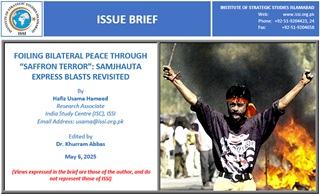Introduction
Owing to bilateral efforts for good-neighbourly relations, reinforced by encouragement from international partners, the first decade of the 21st century generally witnessed a visible improvement in Pakistan-India relations, until the positive trend was suddenly disrupted. To be sure, following back-to-back engagements between the political leadership, India-Pakistan tensions gradually toned down; the composite dialogue process proceeded apace; trade indicators improved; Kashmir-related confidence-building measures eased Kashmiris’ hardships; bilateral sports engagements returned; and people-to-people ties soared. Among other indicators of markedly improving ties was the continued rail link between the two countries through Samjhauta Express. Initiated in 1976 following the signing of the Simla Agreement (1972), the train service between Pakistan’s Lahore and India’s Delhi was not just a symbol of growing peace between the two arch-rivals, but also a crucial channel to reunite the families divided by the heated borders since 1947. Unfortunately, certain quarters in India did not take the emerging thaw positively. On the midnight of 18 February 2007, the Samjhauta Express was targeted in Haryana by a horrifying terror attack. Two coaches were completely burned to ashes, leaving 68 people dead, most of whom were Pakistani nationals returning home after meeting their loved ones on the other side. What unfolded in the subsequent years exposed a deep-rooted nexus between ‘Hindutva’ forces and terror outfits, conspiring to orchestrate Hindu nationalist terrorism across India.
















